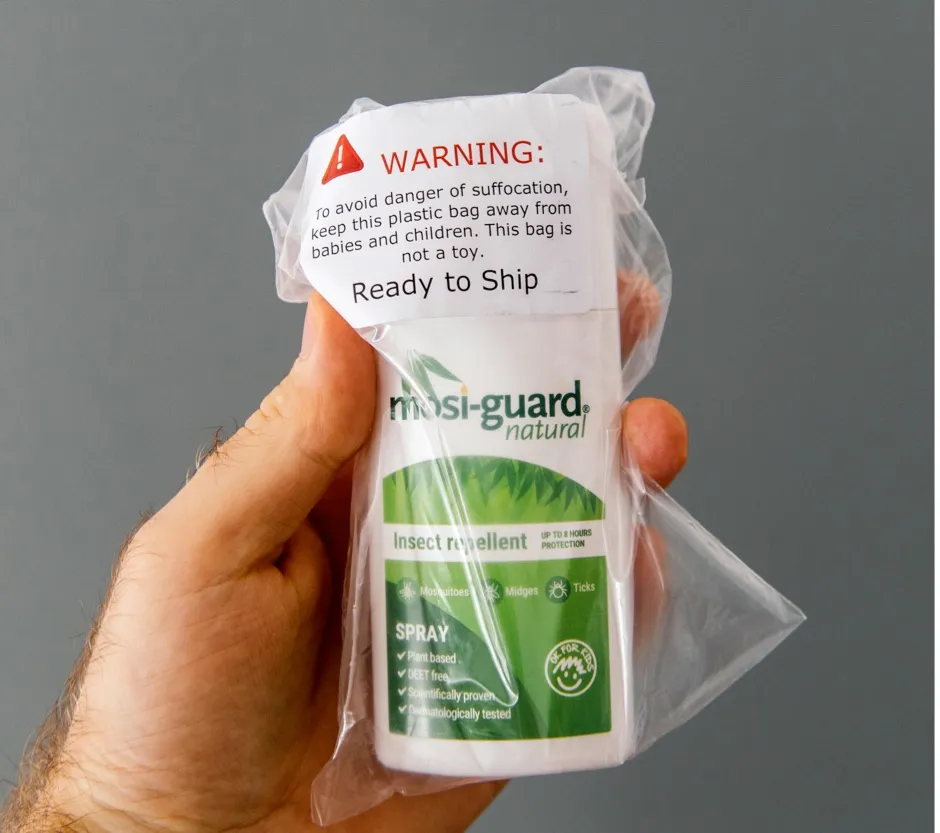A product found in insect repellent may have anti-viral properties against COVID-19, research by Britain’s defence laboratory suggests.
Laboratory tests of Citriodiol, which is found in Mosi-guard Natural, indicate it could reduce the amount of virus detectable in a sample.
Read the latest coronavirus news:
- Oxford vaccine could be put before regulators by the end of the year
- Cambridge vaccine gets £1.9 million to begin clinical trials
- Nottingham woman believed to be first to contract coronavirus in UK
Scientists at the Defence Science and Technology Laboratory (DSTL) adopted two experimental approaches to test the product.
They assessed its anti-viral activity when applied directly to the virus as a liquid drop, and also assessed the product following its application to latex synthetic skin.
One-minute liquid suspension tests indicated that Mosi-guard Natural has anti-viral activity against SARS-CoV-2 England-2 – an isolate taken from a patient in the UK and obtained from Public Health England (PHE) Colindale – if mixed with the virus in the liquid phase.
The study found that at a higher concentration (90 per cent), Mosi-guard Natural gave a significant decrease of the virus, resulting in no recoverable amount, while viral studies on latex indicated that Mosi-guard Natural had anti-viral activity against SARS-CoV-2 England-2 isolate.

But the report highlights that latex synthetic skin was impregnated with Mosi-guard, and while latex is used as a representative surface, it is unlikely to behave exactly as treated human skin.
The scientists wrote: “We have no data relating the concentration applied experimentally to the latex to that resulting from a spray and rub application of Mosi-guard on human skin.”
They added that while under the conditions tested, pre-application of Mosi-guard to a latex synthetic skin resulted in a reduction of the virus, “SARS-CoV-2 England-2 isolate was recoverable from all surfaces tested and did not result in complete viral inactivation on the latex synthetic skin”.
“In summary, SARS-CoV-2 England-2 was recovered from all treated samples,” they said.
Read more about protecting yourself from COVID-19:
- How can I protect myself from the coronavirus when shopping?
- COVID-19: Face shields alone ‘unlikely’ to protect hairdressers and barbers
- Is hand-washing really the best thing we can do to stop the spread of COVID-19?
The scientists released their findings on Wednesday, as the foundation for other scientific bodies who are researching the virus and possible solutions.
DSTL is hopeful the results can be used as a springboard for other organisations to expand and develop the research, as well as to confirm the findings in this publication.
Defence minister Jeremy Quin said: “We are sharing our preliminary findings today so others can take forward additional research to confirm and expand on our findings.”
“Defence has played a wide variety of roles in supporting efforts to tackle coronavirus," said Quin.
“We are pleased that this is another example of Defence sourcing innovative ways to keep people safe.”
In May, Defence Secretary Ben Wallace confirmed the insect repellent was being given to the Armed Forces to offer potential protection against coronavirus.
He said a Citriodiol-based spray had been given to personnel in light of the Surgeon General’s advice that it would “do no harm” and should be used on a precautionary basis as an “additional layer of protection” against exposure to the virus.
Can I get the coronavirus from a parcel?
It’s hypothetically possible, but parcels pose a very small risk.
A US study found that the coronavirus can survive for up to 24 hours on cardboard (and paper is likely to be similar). So for the parcel to be contaminated, someone with COVID-19 would have had to touch or cough on your parcel within the past day.
The chances of this are low, but common sense advice would be to wash your hands with soap and water after opening the parcel, and then again after you’ve disposed of the packaging – especially if you or anyone else in your household is in one of the vulnerable groups.
The same study found that the virus can survive for up to three days on hard, shiny surfaces such as plastic and stainless steel – which is why door handles are particularly good vectors for the virus. So, if you receive anything packaged in plastic, such as takeaway deliveries, make sure to wash your hands after touching it, and especially before eating.
We don’t yet know how long the virus can survive on smartphone screens, but it’s likely to be up to three days. This means that you should ideally clean your phone with disinfectant wipes (Apple recommends 70 per cent isopropyl alcohol wipes), at least once a day.
Read more:
